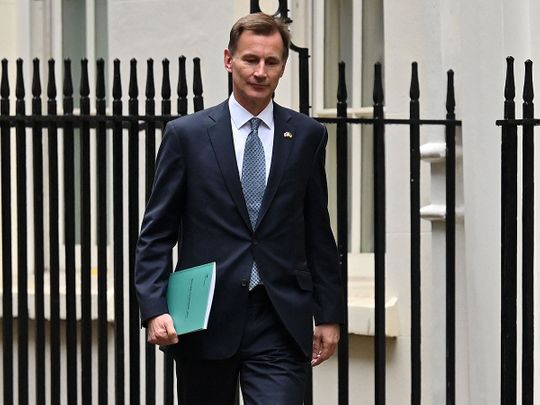
British government is in a tough place with its public finances undermined by pandemic, Ukraine, inflation and Brexit
Dear Editor, can I have some more money please? As of Thursday morning, things just a lot worse for me, here, living and based mostly in the United Kingdom.
On Thursday morning, as part of the UK Government’s attempts to shore up their public finances and plug a gaping hole in their balance sheet — one that was largely exacerbated by the Conservatives themselves in early September under the premiership of Liz Truss, remember her? — I and millions of others who live and work here, will be paying more in taxes.
And as well as paying more, there will be less funding for public services to go around.
Is it any wonder that earlier this week, two large Local Government councils — in the conservative heartlands of Hampshire and Kent — warned that they are about to go bankrupt. That means they’d be unable to collect rubbish, keep streets clean, meet their educational responsibilities, fail to provide social care for vulnerable children and adults, provide a roof over the head for the homeless, shut libraries, halt bus and transport responsibilities, and stop caring for seniors in their care.
Yes, there is something seriously wrong with the UK’s public finances and the way it funds — or more accurately, fails to fund its public services and organise its tax-collecting responsibilities.
Let’s stop and remind ourselves that this is no Third World country, but rather the sixth largest economy in the world, a member of the G7 group of nations and a veto-holding power on the United Nations Security council.
Yet it is failing to make ends meet — as anybody in the UK who has had to wait for doctors appointments, call an ambulance, or rely on any other service offered by the Government.
As an example, my blood pressure has been quite high lately. I am waiting two weeks from a call back from the doctor’s surgery — yes, I call them regularly to remind them — but I anticipate that it will be Dec. 6 before I can get 10 minutes with my regular General Practitioner.
High blood pressure
And after Thursday’s budget delivered by the chancellor of the Exchequer Jeremy Hunt, my blood pressure isn’t likely to come down anytime soon.
Hunt announced a combination of savings, service cuts and tax increases totalling £55 billion that will inflict pain on anyone here who pays taxes.
And he also said that from now on, the underlying debt for the UK must fall as a percentage of GDP by the fifth year in a rolling five-year period, and public sector borrowing over the same period must be below 3 per cent of GDP.
As things stand now, pretty much for every £1 in circulation in the economy, the Government owes another £1 to its lenders. And with interest rates at higher levels than they were when Truss blew up the UK economy in September, it costs much more now to service that borrowing — hence the push to cut the debt-to-GDP ratio.
The pandemic and keeping Brits at work, or at least paid, ripped a £400 billion hole in the government’s finances. Britain wasn’t alone, and most western countries did something similar, pushing the world’s public and private debt mountain to $226 trillion. But the debt costs are far higher now than during the pandemic — costing about £50 billion to pay back each year, or roughly the same as the UK Government spends on its defence each year.
Sure, the conflict in Ukraine has added pain for every household. Because energy prices have been increasing by about 60 per cent since February when the Russians moved into eastern Ukraine, fuel costs have been a huge factor in driving inflation that, earlier this week, touched 11.1 per cent.
If everyone is mentioning the pandemic and Ukraine, few in Government in the UK are willing to mention Brexit for causing a huge hold in the economy. Mark Carney, the former Governor of the Bank of England, has been bold enough to say that it wiped 20 per cent from the economy.
No Brexit-loving Tory MP worth their salt would dare say such a thing. The reality is that Brexit has been a significant blow — and yes, the pandemic and Ukraine have only exacerbated that pain.
The Office for Budget Responsibility in the UK points to a 4 per cent drop in UK GDP. But is telling the whole truth or looking at the whole picture. The highly regarded Economic and Social Research Institute in Dublin recently reported that trade from the UK to the EU had fallen 16 per cent on the levels anticipated had Brexit not happened.
In trade from the EU to the UK, it was down 20 per cent on the same measure — which underscores Carney’s observations.
Add in that some 500,000 foreign-born workers that were expected in 2019 to be part of the UK workforce in 2022 now live elsewhere. That means less skilled workers to hire, lower productivity, and lower tax yields from their weekly pay packets too.
Years of austerity pared public services and local councils back to the bone. There is no more cutting room — as the two southern councils have warned.
The National Health Service was so cut back, it was ill-prepared for the pandemic and it has become clear that the absence of slack in the health system has caused huge knock-on effects for the economy. And yes, a lot of the European nursing and medical staff simply left because of Brexit.
The Macmillan Cancer Support charity is warning that, for example, in September only 53.3 per cent of people with cancer were treated on time, leaving almost 1 in 2 cancer patients in Wales to face delays in the lifesaving treatment they need.
It means that in one month alone, 774 people with cancer and their loved ones were left to face heartbreaking delays, and the anxiety that their condition could worsen while they wait for their treatment to begin.
Right now, though, the economic sickness facing Britain just seems so overwhelming. And the cure involves a lot of fiscal pain for everyone.








